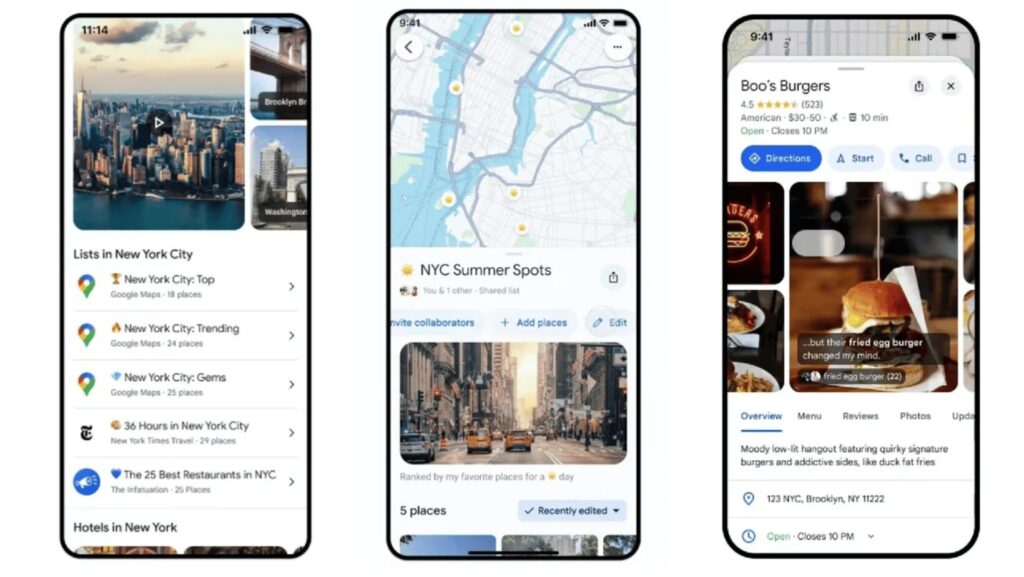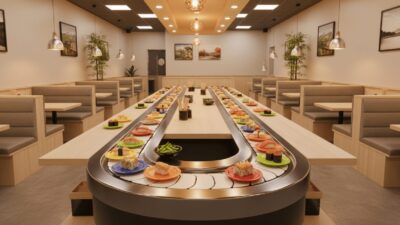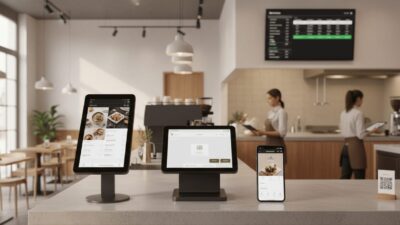The way people search for restaurants is changing fast.
And, if you own a coffee shop, a quick-service restaurant (QSR), or a fast-casual eatery, this change matters to you.
Gone are the days when a Google listing and a few reviews were enough. Now, powerful tools like ChatGPT and Google Gemini are helping people decide where to eat before they even open a traditional search engine—and that shift is already impacting how visible restaurants are online.
So, if you’re feeling overwhelmed by restaurant SEO, you’re not alone.
This guide is here to explain what’s happening, why it matters, and—most importantly—what you can do about it, even if you don’t have a marketing team.
Let’s get started!
What’s happening with restaurant SEO?
AI tools are changing how people search
Search is no longer just about keywords and websites.
AI tools like ChatGPT and Google Gemini are trained to answer people’s questions directly, pulling from and “reading” thousands of online sources, including restaurant websites, reviews, menus, blogs, and social posts.
So, when someone types “Where can I get the best breakfast sandwich in Austin?”, AI tools don’t just show links—they summarize the results and make recommendations.
But if your restaurant isn’t part of the content AI can “read?”
You might not make the list AI pulls up for its users.
And that means you could be missing out on real business—no matter how good your food and service is.
Why discovery now happens outside your website
In the past, someone might search for “pizza near me” and scroll through a list of links.
Today, AI will tell them, “Try Joe’s Brick Oven Pizza. They have amazing crust, and locals rave about the garlic knots.”
How did AI know that?
It read online reviews, social posts, and any content that mentioned Joe’s Pizza. It may never have visited Joe’s website, but it formed its own opinion based on signals from the digital world..
This is why having accurate, engaging content across multiple platforms—like Google Business, review sites, and even Reddit—is more important now than it ever has been.

Why Reddit is suddenly in your marketing plan
Have you noticed that Reddit is showing up more in Google search results?
That’s because people trust real experiences, and Reddit is full of those.
When someone searches for “best tacos in LA,” Google might highlight a Reddit thread where locals passionately debate their favorite spots—and that kind of conversation carries weight.
AI tools love this kind of content because it’s detailed, authentic, and rich with context… and for independent restaurants, this is a chance to shine.
People love recommending hidden gems. If someone mentions your spot in a Reddit comment, AI will pick it up. That could help drive new business—without you spending a dime on ads.
Pro Tip → Join the conversation authentically. Share tips, answer questions, and engage like a local.
Why restaurant SEO matters
If you’re not adapting your online presence to how AI tools work, your restaurant could become digitally invisible.
Here’s why that’s a problem:
1. Fewer diners will discover you
AI doesn’t just rely on websites. It pulls from reviews, community posts, and structured data. If you’re missing from those sources, you won’t get recommended.
2. Competitors will outrank you
Even if your competitors’ food isn’t better than your restaurant’s, they’ll show up in more searches if they’re optimizing for AI and you’re not.
3. You’ll miss local intent searches
These are high-conversion queries like “best cold brew near me” or “family-friendly lunch spots in Asheville.” AI answers those directly, and your visibility there depends on your digital footprint.
Ultimately, the longer you wait to adapt to AI, the more ground you’ll lose.
4. Younger diners are now a majority
Consumers under 50 are most likely to use AI tools for research and discovery, making younger diners more likely to ask ChatGPT where to eat or let Google Gemini give recommendations.
So, if your restaurant isn’t visible to these kinds of AI tools, it’s also not visible to the next generation of loyal guests.

4 steps to better restaurant SEO
Step 1 — Modernize your SEO strategy
- Make your website more than a menu: Include FAQ-style pages like: “What’s on your seasonal menu?” “Do you have vegan options?” or “Where do you source ingredients?”
- Keep your listings fresh: Update your hours, photos, categories, and links on Google Business, Yelp, and TripAdvisor.
- Use local, natural language: Think “cozy coffee shop near Beacon Hill” or “gluten-free lunch in Boise.”
These basics help both traditional search engines and AI tools understand who you are and what you offer.
Step 2 — Create content that AI can use
- Answer common customer questions: Do you take reservations? Is your patio pet-friendly? Post these answers directly on your site.
- Share your story: Write a short About page that highlights your values, team, or inspiration.
- Keep it fresh — Post once a month about new dishes, events, or even staff shout-outs. AI favors current, active businesses.
You don’t need essays—just consistent, authentic updates in your voice.
Step 3 — Engage where AI is listening
- Focus on the Big 3 (Google, Yelp, TripAdvisor): Ensure profiles are complete, with menu links, categories, and new images.
- Use TripAdvisor for tourist appeal: Ask happy guests to leave a review while memories are fresh.
- Be present on Reddit: Monitor mentions, join your city’s food subreddit, and be part of conversations naturally.
Step 4 — Make the most of guest reviews
- Ask for specifics: Encourage guests to mention dishes, service, or atmosphere.
- Respond to all reviews: AI recognizes engagement, which signals trustworthiness.
- Reinforce keywords naturally: Use phrases like “best tacos in Williamsburg” in your replies (without overdoing it).
Mini case studies: The impact of restaurant SEO on AI
La Pergoletta, a neighborhood Italian restaurant in Los Angeles, saw a surge in traffic after being consistently mentioned in Reddit threads, food blogs, and local influencer roundups.
When users asked ChatGPT or Gemini for “authentic Italian spots in East LA,” La Pergoletta often appeared, thanks to their diverse digital footprint.
And, their secret?
Regular menu updates, review responses, and strong visual storytelling on Instagram and Google.
Daughter Thai Kitchen in San Francisco also benefited from the same AI optimization.
They rolled out a series of behind-the-scenes Instagram Reels showing their kitchen staff, sourcing practices, and cultural heritage, which were quickly reposted on Reddit’s foodie channels.
Then, ChatGPT began recommending them in queries like “best Thai food in San Francisco with a modern twist,” without Daughter Thai having to rely on keyword research tools or a content calendar.
By telling their story online and staying active, both restaurants created a digital footprint AI tools could recognize, and potential customers could find
Getting started with restaurant SEO
If this feels like a lot, that’s because it is!
Luckily, you don’t have to do it all at once.
Here are a few simple (and sustainable) ways to get started, one step at a time.
- Pick one platform: Clean up your most visible listing first—usually Google Business.
- Schedule monthly check-ins: Spend 30 minutes a month refreshing your presence.
- Done is better than perfect: Consistency matters more than perfection.
- Ask for help if needed: A freelancer or local agency can help move things forward without breaking the bank.
One quick restaurant SEO win to try right now
If you only do one thing after reading this:
Optimize your Google Business Profile.
Here’s your checklist:
- Add recent food, team, and interior photos
- Update hours (including holiday/seasonal changes)
- Share a post or event
- Answer common Q&As
- Double-check your menu links and service categories
This takes less than an hour and sends a signal to AI tools that this content is brand-new.
Future predictions: What’s next for restaurant SEO
1 — Search will get more conversational
People will ask, “Where can I get brunch with a view?” and AI will answer with relevance, not just keywords.
2 — Voice and visual search will grow
Expect more guests to search by speaking or using photos. Image quality, alt text, and FAQs will become SEO essentials.
3 — Trust will be built through stories
Authentic storytelling will beat generic profiles. Share your team, your culture, and your why.
4 — Hyperlocal and niche will win
You don’t need to be the best in the city—just the best match for a specific type of diner.
Wrap up
AI isn’t a trend—it’s the new normal. And your digital presence is your new front door.
The restaurants that will thrive are the ones that stay current, tell their story, and show up where people (and AI) are looking using restaurant SEO.
Don’t be afraid to start small, optimizing your Google Profile, responding to a few reviews, or posting a quick Instagram Story about your staff or food.
Every step you take builds trust and visibility.
FAQs
1. What’s the easiest way to start improving my restaurant’s SEO right now?
Start by updating your Google Business Profile. It’s free, it’s fast, and it has an immediate impact on both search engine rankings and AI visibility.
2. How do I know if ChatGPT or Google Gemini is recommending my restaurant?
Search natural phrases like “best lunch near [your city]” in ChatGPT or Google’s AI overview. If you don’t show up, it’s time to update your content and listings.
3. Is it worth it to blog or post updates as a small restaurant?
Yes! Even short updates like new specials or team features help AI tools understand that your business is active.
4. Do I need to hire an SEO expert to compete?
While a freelancer or agency will definitely add value, start with the basics, then expand and invest when you’re ready to scale.
5. How can I encourage more positive reviews from guests?
Ask at the right moment: after a great meal. Have a QR code ready that links to your Google Business Profile, and follow up with sincere responses online.




